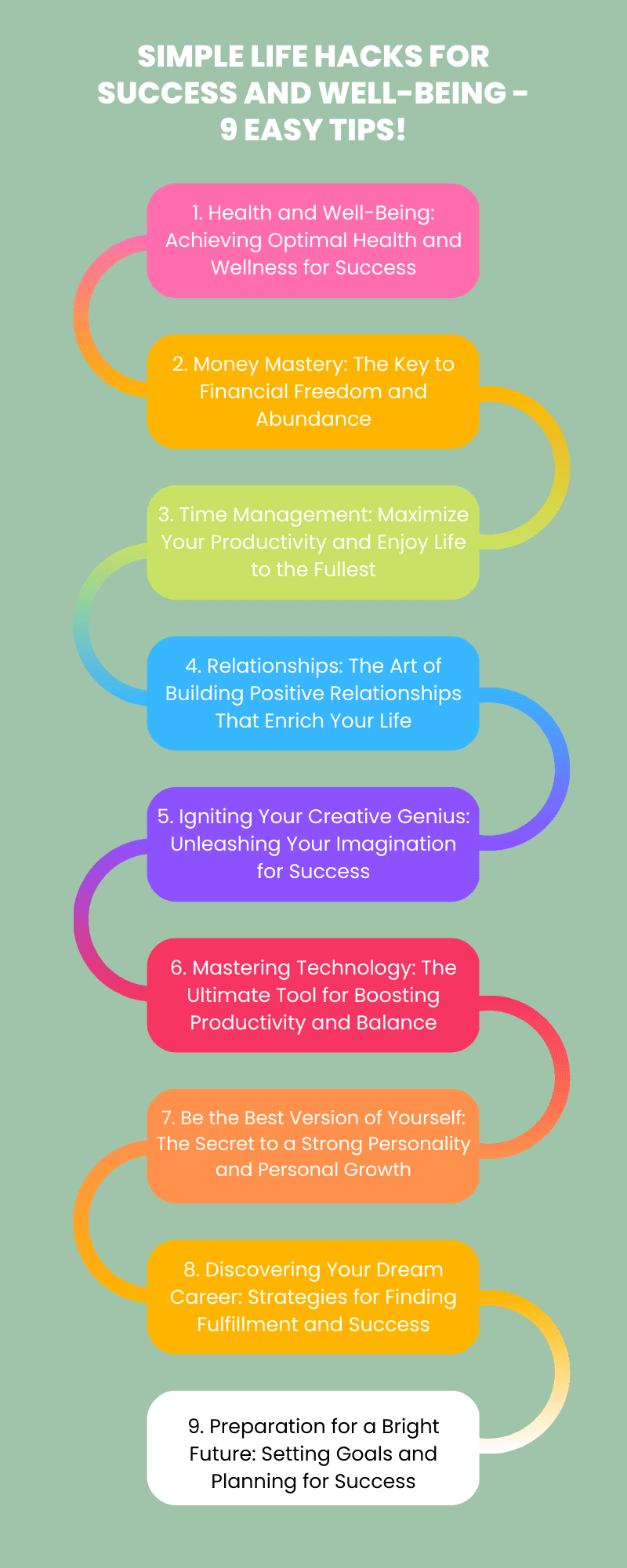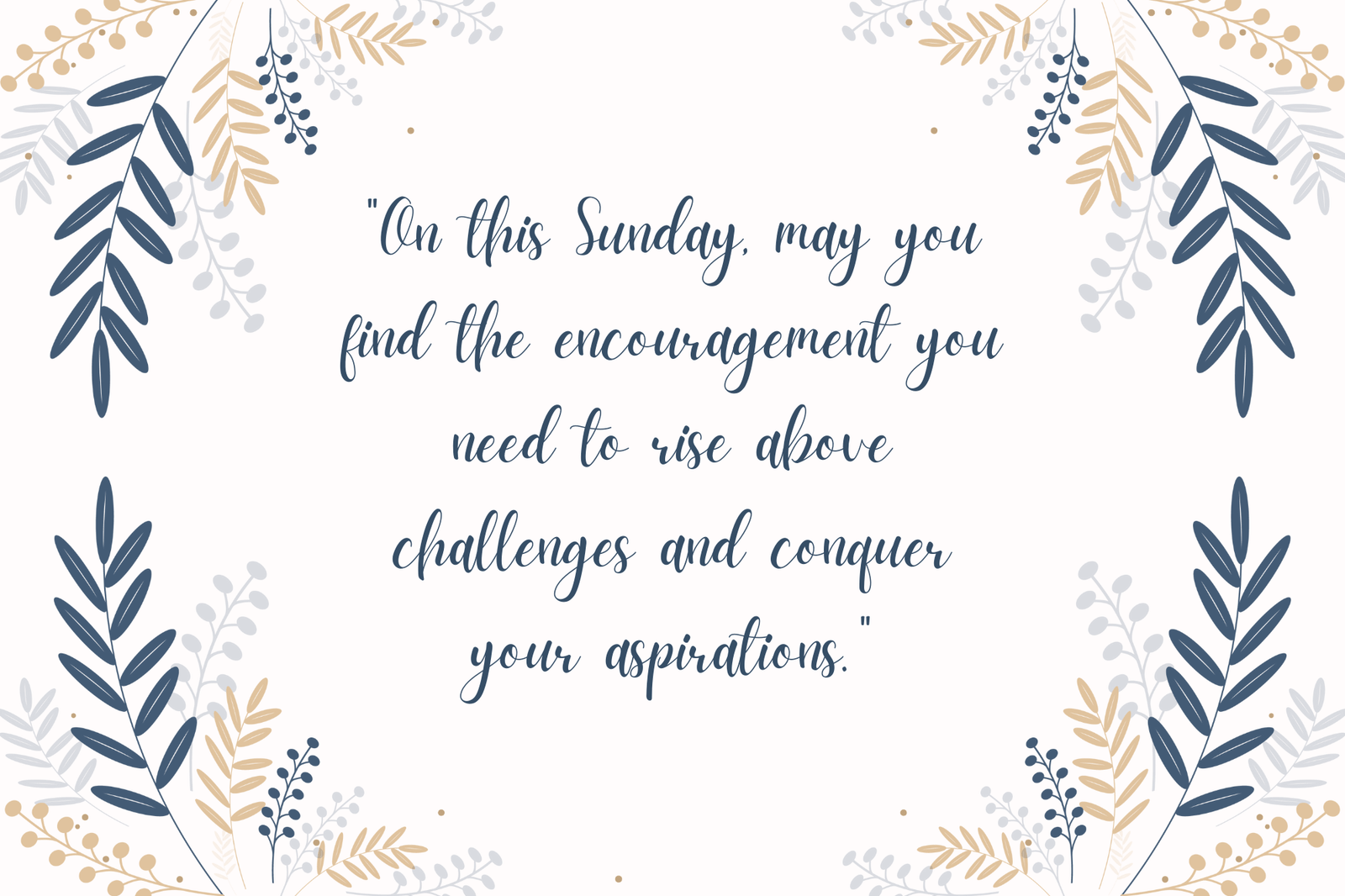Simple Life Hacks for Success and Well-being – 9 Easy Tips!

Sometimes we feel stuck in the same old routine, day after day. And we desire a more fulfilling and rewarding life? Many people struggle to find meaning and purpose in their daily lives, but the good news is that there are actionable steps we can take to improve our well-being and achieve our goals.
In this article, we’ll explore simple life hacks that can help you break free from your comfort zone and reach new heights of success and happiness. Whether you’re looking to improve your relationships, boost your career, or simply live a more fulfilling life, this article has got you covered.

So, let’s dive in and start creating a better life together!
- 1. Health and Well-Being: Achieving Optimal Health and Wellness for Success
- 2. Money Mastery: The Key to Financial Freedom and Abundance
- 3. Time Management: Maximize Your Productivity and Enjoy Life to the Fullest
- 4. Relationships: The Art of Building Positive Relationships That Enrich Your Life
- 5. Igniting Your Creative Genius: Unleashing Your Imagination for Success
- 6. Mastering Technology: The Ultimate Tool for Boosting Productivity and Balance
- 7. Be the Best Version of Yourself: The Secret to a Strong Personality and Personal Growth
- 8. Discovering Your Dream Career: Strategies for Finding Fulfillment and Success
- 9. Preparation for a Bright Future: Setting Goals and Planning for Success
- Conclusion
1. Health and Well-Being: Achieving Optimal Health and Wellness for Success
Physical and mental health are essential components of achieving overall success and well-being. When we prioritize our health, we have more energy, focus, and resilience to tackle challenges and pursue our goals. Here are some ways in which physical and mental health can impact our success:
- Improved productivity: When we are physically and mentally healthy, we have more energy, focus, and creativity to be productive in our work and personal lives.
- Enhanced mental clarity: Good physical and mental health can help us think more clearly and make better decisions.
- Reduced stress: Prioritizing our health can help us better manage stress and build the resilience we need to cope with challenges.
Here are some practical and holistic tips to help you maintain optimal health and well-being:
- Exercise regularly: Regular exercise is essential for maintaining physical health and reducing stress. Aim for at least 30 minutes of moderate exercise per day, such as walking, cycling, or swimming.
- Eat a balanced diet: A balanced diet of different foods can provide our bodies with the nutrients needed for optimal health. Aim to include a variety of fruits, vegetables, whole grains, lean protein, and healthy fats in your diet.
- Practice mindfulness: Mindfulness practices such as meditation and yoga can help reduce stress and improve mental well-being.
- Get enough sleep: Aim for seven to nine hours of sleep each night to ensure that your body and mind are well-rested and ready for the day ahead.
- Cultivate positive relationships: Positive relationships with friends, family, and colleagues can have a significant impact on our mental and emotional well-being.
- Practice self-care: Make time for activities that bring you joy and help you relax, such as reading, walking, taking a bath, or listening to music.
Remember, achieving optimal health and well-being is a journey that requires ongoing effort and commitment. By prioritizing your health and well-being, you can achieve success in all areas of your life. Incorporate these tips into your daily routine and see the positive impact they can have on your life.
2. Money Mastery: The Key to Financial Freedom and Abundance
Financial stability can be a key factor in opening doors to opportunities and improving overall well-being. When you have your finances under control, you can make choices based on your preferences and values rather than just on the available resources. Here are some ways in which financial stability can improve your life:

- More freedom to pursue your goals: When you have a stable income and a solid financial plan in place, you have the flexibility to pursue your goals without worrying about financial constraints.
- Reduced stress: Financial stability can reduce stress and anxiety related to money matters. It can give you the confidence to handle unexpected expenses and plan for the future.
- Better relationships: Money problems are a common source of conflict in relationships. When you have a stable financial condition, it can reduce arguments and improve communication in your relationships.
Here are some practical tips to help you master your finances:
- Create a budget: Start by tracking your income and expenses to create a realistic budget. Identify areas where you can reduce costs and make adjustments to your spending habits.
- Build an emergency fund: Set aside some money in an emergency fund to cover unexpected expenses. Aim to have three to six months of living expenses saved up.
- Pay off debt: Make a plan to pay off any debt you have. Prioritize paying off high-interest debt first, such as credit card debt.
- Automate your savings: Set up automatic transfers to a savings account or retirement fund. This can help you save money without even thinking about it.
- Invest for the future: Start investing in a retirement account, such as a 401(k) or IRA. If you have extra funds, consider investing in stocks, bonds, or real estate.
- Stay informed: Stay up-to-date on financial news and trends. Read books and articles on personal finance and seek advice from financial professionals when necessary.
Remember, mastering your finances takes time and effort. Stay committed to your financial goals, and don’t be afraid to ask for help along the way. By taking control of your finances, you can achieve financial freedom and abundance in your life.
3. Time Management: Maximize Your Productivity and Enjoy Life to the Fullest
Proper time management can have a significant impact on our ability to achieve our goals and live a more fulfilling life. When we manage our time effectively, we can make the most of each day, reduce stress, and achieve a better work-life balance. Here are some ways in which time management can help us:
- Achieving our goals: Time management helps us prioritize our tasks and focus on what is important. By breaking down larger goals into smaller, manageable tasks, we can make progress toward our goals each day.
- Reducing stress: When we manage our time effectively, we can reduce the stress and overwhelm that come with having too much to do and not enough time.
- Improving work-life balance: Effective time management helps us make time for the things we enjoy outside of work, such as hobbies, spending time with loved ones, and self-care.
Here are some practical tips to help you take control of your time and be more productive:
- Plan your day: Start your day with a plan. Write down your tasks for the day and prioritize them based on importance and urgency.
- Create a schedule: Make a schedule for your day and stick to it. Schedule time for breaks, exercise, and other activities to ensure that you have a healthy work-life balance.
- Avoid multitasking: Multitasking can reduce productivity and increase stress. Focus on one task at a time and give it your full attention before moving on to the next.
- Eliminate distractions: Minimize distractions by turning off notifications on your phone and closing unnecessary tabs on your computer.
- Take breaks: Take regular breaks throughout the day to recharge your energy and improve your focus.
- Delegate tasks: Delegate tasks to others when possible to free up time for important tasks that only you can do.
- Learn to say no: Saying no to tasks that do not align with your priorities can help you focus on what is important.
Remember, time is a limited resource. By managing our time effectively, we can make the most of each day and live a more fulfilling life. Start by implementing some of these tips into your daily routine and seeing the difference it can make in your life.

4. Relationships: The Art of Building Positive Relationships That Enrich Your Life
Positive relationships are crucial for personal growth and happiness. They can provide us with support, encouragement, and a sense of belonging. Good relationships can also help us navigate difficult times, reduce stress, and increase our overall well-being. Here are some ways in which positive relationships can impact our lives:
- Emotional support: Positive relationships can provide us with emotional support during challenging times, such as illness or a personal crisis.
- Personal growth: Good relationships can help us learn from others and expand our perspectives, leading to personal growth and development.
- Increased well-being: Positive relationships can improve our overall well-being and happiness, reducing stress and providing a sense of fulfillment.
Here are some practical tips to help you build and maintain positive relationships:
- Listen actively: Listen carefully to what others have to say and show that you are interested in their thoughts and feelings.
- Communicate clearly: Express yourself clearly and respectfully, and be open to feedback and constructive criticism.
- Show appreciation: Show appreciation for the people in your life by expressing gratitude and recognizing their contributions.
- Quality time: Spend quality time with your loved ones by doing activities that you both enjoy.
- Practice forgiveness: Let go of grudges and practice forgiveness to maintain healthy relationships.
- Be reliable: Be present for your loved ones when they need you and follow through on your commitments.
Remember, building positive relationships takes time and effort, but the rewards are worth it. By prioritizing relationships and practicing these tips, you can build and maintain meaningful relationships that enrich your life.
5. Igniting Your Creative Genius: Unleashing Your Imagination for Success
Creativity is a valuable tool for achieving success in many areas of life. It allows us to think outside the box, generate new ideas, and solve problems in new and innovative ways. Here are some ways in which creativity can impact our lives:
- Innovation: Creativity can lead to new and innovative ideas that can transform industries and change the world.
- Problem-solving: Creative thinking can help us find solutions to problems that seem impossible.
- Self-expression: Creativity allows us to express ourselves in unique and authentic ways, leading to personal growth and fulfillment.
Here are some practical tips to help you tap into your creative potential:
- Engage in creative activities: Engage in activities that inspire creativity, such as writing, drawing, or playing music.
- Practice mindfulness: Mindfulness practices, such as meditation, can help clear your mind and increase focus, allowing for more creative thinking.
- Surround yourself with inspiration: Surround yourself with things that inspire you, such as artwork or quotes.
- Take breaks: Taking breaks and engaging in activities outside of work can stimulate creativity and prevent burnout.
- Collaborate with others: Collaborating with others can lead to new and innovative ideas that may not have been possible alone.
- Experiment with new ideas: Don’t be afraid to try new things and experiment with ideas that may seem unconventional.
Remember, creativity is not just reserved for artists and writers. Everyone has the potential to tap into their creative genius and achieve their goals. By incorporating these tips into your daily routine, you can unleash your imagination and achieve success in all areas of life.
6. Mastering Technology: The Ultimate Tool for Boosting Productivity and Balance
Technology has become an integral part of our daily lives, and when used properly, it can be a powerful tool for boosting productivity and achieving work-life balance. Here are some ways in which technology can impact our lives:
- Efficiency: Technology can help us accomplish more in less time, allowing us to be more productive and efficient in our work.
- Flexibility: Technology allows us to work from anywhere, making it easier to achieve work-life balance by giving us more control over our schedules.
- Communication: Technology has revolutionized the way we communicate, making it easier to connect with others and collaborate on projects.

Here are some practical tips to help you optimize your use of technology:
- Set boundaries: Set boundaries around your technology use, such as turning off notifications during specific times of the day.
- Prioritize tasks: Use technology to prioritize tasks and streamline your workflow, making it easier to focus on the most important tasks.
- Take breaks: Taking breaks from technology can help prevent burnout and improve your overall well-being.
- Use technology mindfully: Be mindful of your technology use and avoid using it as a distraction from important tasks or personal interactions.
- Customize your technology use: Customize your technology use to fit your needs, such as by using productivity apps or software that helps you stay organized.
- Protect your well-being: Take steps to protect your well-being, such as using blue light filters to reduce eye strain and taking frequent breaks to stretch and move.
Remember, technology can be a valuable tool for boosting productivity and achieving work-life balance when used mindfully and intentionally. By incorporating these tips into your daily routine, you can optimize your use of technology and improve your overall well-being.
7. Be the Best Version of Yourself: The Secret to a Strong Personality and Personal Growth
A strong personality is a foundation for personal growth, success, and happiness. It involves being self-aware, continually improving ourselves, and staying true to our values and beliefs. Here are some ways in which cultivating a solid personality can impact our lives:
- Self-awareness: Being self-aware allows us to understand our strengths, weaknesses, and areas for growth, leading to personal growth and self-improvement.
- Confidence: A strong personality is often associated with confidence, which can help us achieve success in our personal and professional lives.
- Resilience: Cultivating a strong personality involves developing resilience, which allows us to bounce back from setbacks and persevere through challenges.
Here are some practical tips to help you cultivate a strong and positive personality:
- Practice gratitude: Practicing gratitude can help shift our focus from negative to positive, leading to a more optimistic and resilient outlook.
- Practice self-reflection: Take time to reflect on your thoughts, emotions, and actions and identify areas for growth and improvement.
- Learn new skills: Learning new skills can help build confidence, expand our knowledge, and open doors to new opportunities.
- Embrace your uniqueness: Embrace your uniqueness and stay true to your values and beliefs, even in the face of adversity.
- Practice self-care: Prioritize self-care, including getting enough rest, exercise, and proper nutrition, to improve your overall well-being.
- Surround yourself with positive influences: Surround yourself with positive people who inspire and support your personal growth and development.
Remember, cultivating a strong personality is a lifelong journey that requires commitment and effort. By incorporating these tips into your daily routine, you can develop a strong and positive personality that will lead to personal growth, success, and happiness.
8. Discovering Your Dream Career: Strategies for Finding Fulfillment and Success
A fulfilling career can have a significant impact on our overall well-being and quality of life. It can provide us with a sense of purpose, accomplishment, and financial stability. Here are some ways in which a fulfilling career can enhance our lives:
- Sense of purpose: A fulfilling career can give us a sense of purpose, helping us to feel that our work has meaning and contributes to something greater than ourselves.
- Financial stability: A fulfilling career can provide us with financial stability, allowing us to support ourselves and our loved ones and achieve our financial goals.
- Personal growth: A fulfilling career can help us develop new skills, learn about new industries, and meet new people, leading to personal growth and development.
Here are some practical tips to help you discover your dream career and achieve success:
- Self-assessment: Take time to reflect on your values, interests, strengths, and weaknesses to identify career paths that align with your skills and passions.
- Research: Investigate different industries and job opportunities to gain a better understanding of the skills and education required for different careers.
- Networking: Connect with professionals in your desired industry to gain insights and advice on how to break into the field.
- Set goals: Set clear, measurable, and achievable career goals to help you stay focused and motivated on your path to success.
- Continuous learning: Continuously learn and develop new skills to stay relevant and competitive in your field.
- Take risks: Take calculated risks, such as pursuing new opportunities or taking on challenging projects, to stretch your skills and grow professionally.
Remember, discovering your dream career is a journey that requires patience, perseverance, and hard work. By incorporating these tips into your career planning, you can find fulfillment and success in your chosen career path.

9. Preparation for a Bright Future: Setting Goals and Planning for Success
Setting goals and planning for success are crucial for achieving long-term happiness and fulfillment. It allows us to focus on our priorities, take control of our lives, and make progress toward our desired future. Here are some ways in which goal-setting and planning can help us achieve success:
- Clarity: Setting clear and specific goals helps us gain clarity on what we want to achieve and how to get there.
- Motivation: Goals give us a sense of direction and purpose, motivating us to take action and make progress toward our desired outcomes.
- Accountability: Planning helps us hold ourselves accountable for our actions and progress toward our goals.
- Flexibility: Flexibility allows us to adapt to changes and challenges along the way, helping us stay focused on our goals despite obstacles.
Here are some practical tips to help you set SMART goals, create action plans, and adapt to changes along the way:
- Specific: Set specific and measurable goals that are clear and well-defined.
- Measurable: Ensure your goals are measurable so that you can track your progress and celebrate your achievements.
- Achievable: Set goals that are challenging but achievable based on your skills, resources, and timeline.
- Relevant: Set goals that are relevant to your personal or professional growth and align with your values and priorities.
- Time-bound: Set deadlines for achieving your goals to keep you focused and motivated.
- Create an action plan: Create a detailed action plan that outlines the steps required to achieve your goals.
- Track your progress: Monitor your progress regularly and adjust your action plan as needed.
- Celebrate your successes: Celebrate your achievements along the way to stay motivated and boost your confidence.
Remember, setting goals and planning for success is a continuous process that requires commitment, discipline, and flexibility. By incorporating these tips into your planning and goal-setting process, you can prepare for a bright future and achieve success and happiness in the long term.
Conclusion
In this article, we explored key areas for personal growth and success and shared practical and innovative tips and tricks to help cultivate a positive mindset, master their finances, take control of their time, maintain optimal health, build positive relationships, unleash their creativity, optimize their use of technology, develop a strong personality, explore career options, and set SMART goals for the future.
We hope that this article has inspired you to take action toward your personal growth and success. We encourage you to implement these tips and tricks shared in the article and take steps toward living a fulfilling and meaningful life.
Remember, personal growth and success are ongoing journeys that require continuous effort, dedication, and a willingness to learn and grow. By incorporating these skills and habits into your daily life, you can achieve your goals and live the best possible life.












